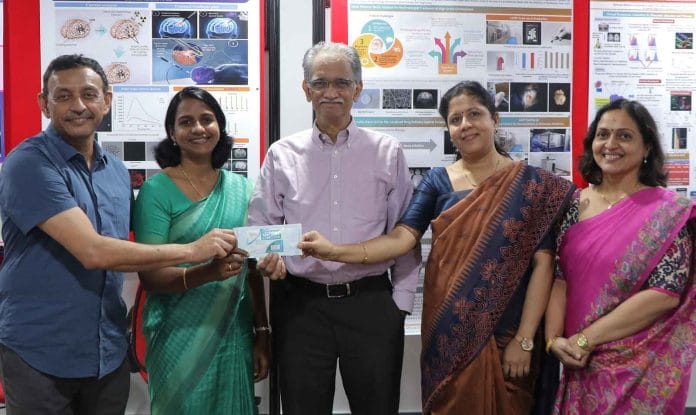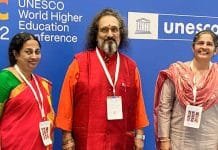
Amrita Vishwa Vidyapeetham develops world’s first synthetic jaw-bone graft gets Govt. nod for clinical trial
- The project is funded by Dept of Science & Technology, Govt. of India, and BIRAC
- The synthetic bone graft provides a first-of-its-kind solution in the world for patients who lose part of their lower jaw (mandibular bone) due to cancer, injury, or trauma
- Amrita Vishwa Vidyapeetham has got Government approval for starting clinical trial of the product. This is the first time that an Indian university has innovated a medical product and taken it from lab research to a potentially successful medical application
- The clinical trial will be conducted on ten patients over a period of two years
INVC NEWS
Hyderabad,
Amrita Vishwa Vidyapeetham, ranked the 5th Best Overall University in India in the 2020 National Institution Ranking Framework (NIRF), has got a landmark approval from the Central Drugs Standard Control Organization (CDSCO) for conducting pilot clinical trial for a novel bone graft developed jointly by Amrita School of Nanosciences, Amrita School of Medicine and Amrita School of Dentistry, Kochi. The project was funded by the Dept. of Sciences and Technology, Govt. of India, in the initial lab phase and then by Biotechnology Industry Research Assistance Council (BIRAC) for the translational large animal testing and regulatory testing phases.
The synthetic bone graft, named Nanotex Bone, provides a first-of-its-kind solution in the world for patients who lose part of their lower jaw (mandibular bone) due to cancer, injury, or trauma. The product, patented by Amrita Vishwa Vidyapeetham, also accepts tooth implants, enabling patients to lead a close-to-normal life even after losing a portion of their oral cavity bone. The clinic trial, that entails testing on ten patients, will be conducted at Amrita School of Medicine and Amrita School of Dentistry, Kochi. It is expected to be completed in 2 years. This is the first time that a university in India has innovated a medical product and taken it all the way from lab research to a potentially successful medical application on its own.
Said Dr. Shantikumar Nair, Dean of Nanosciences, Center for Nanosciences & Molecular Medicine, Amrita Vishwa Vidyapeetham, who is spearheading the Nanotex Bone project: “We are the first and only university in India to develop a medical implant and get approval from the Government for testing on humans, with an in-house established ISO-certified GMP facility. This GMP has clean room processing lines for implant and oncology products where the test products can be manufactured. No other educational institution in India has established a GMP facility for manufacture of medical implants and nanomedicines, and none is directly associated with a hospital, like we are with the 1,300-bed Amrita Hospital in Kochi. This is what makes Amrita Vishwa Vidyapeetham unique.”
Said Dr. Subramania Iyer, Professor & Chairman of Plastic & Reconstructive Surgery and Head & Neck Surgery at Amrita School of Medicine, Kochi, who is renowned for conducting India’s first-ever hand transplant in India: “The development of Nanotex bone graft and bringing it up to clinical trial was a journey that took us ten years. The product, which can be used for mandible augmentation, will be immensely helpful for 50-60% of patients of jaw cancer. It will also be tremendously useful for patients of oral cancer, which is responsible for 25% of all cancer-related deaths in India, as well as for road accident victims who require facial reconstruction. The method will not add any significant cost to treatment of patients but immensely improve their quality of life.”
The team involved in developing Nanotex Bone comprises several Amrita scientists from various specialties. From the technology side are Dr. Manitha Nair, Dr. Deepthy Menon and Dr. Shantikumar Nair from the Amrita School of Nanosciences. From the medical side, the clinical scientists involved include Dr. Subramanyam Iyer from the Amrita School of Medicine and Dr. Manju Vijaymohan from the Department of Prosthodontics and Implantology, Amrita School of Dentistry.
The feat of developing Nanotex bone graft was made possible due to the efforts of many outstanding medical students involved in different stages of material development like design and development, in-vitro studies, small and large animal studies, regulatory and validation studies, and GMP production. The Amrita GMP facility is granted with ISO 13485 quality management system approval to provide medical devices as per regulatory and customer requirements. This is first time in India that an academic Institute has set up such advanced facility for clinical trial investigation.
Oral cavity cancers account for second highest incidence (10.3%) of cancer in India, with 1,35,929 new cases every year and 8.8% mortality. The International Agency for Research on Cancer (IARC) has predicted that India’s incidence of oral cancer will rise to more than 1.7 million in 2035 due to increase in number of people chewing tobacco. Cancer statistics in India (2018) show oral cancer as the leading cause of mortality in men, responsible for 25% of all cancer-related deaths. Road traffic accidents are common in India, often leading to facial disfigurement and trauma. About 50% of victims of orofacial trauma need to undergo reconstruction surgery. Considering this, the development of Nanotex bone graft for mandibular augmentation is very significant and will provide hope to large number of patients who have lost part of their lower jaw.










